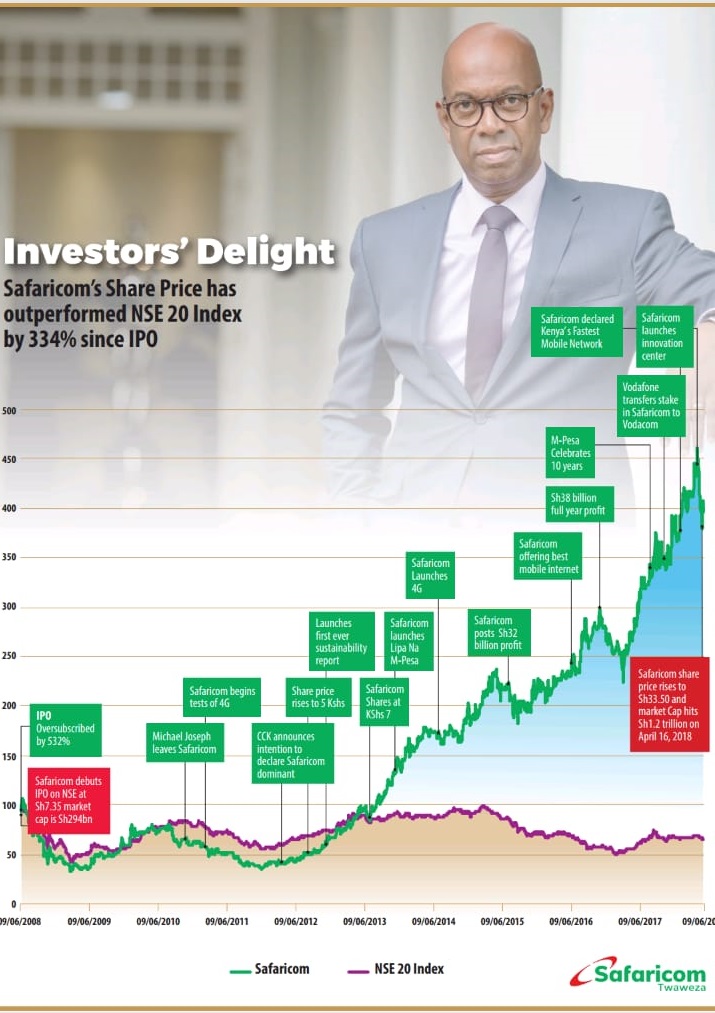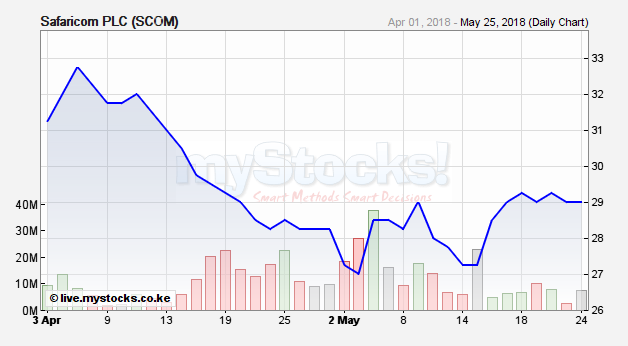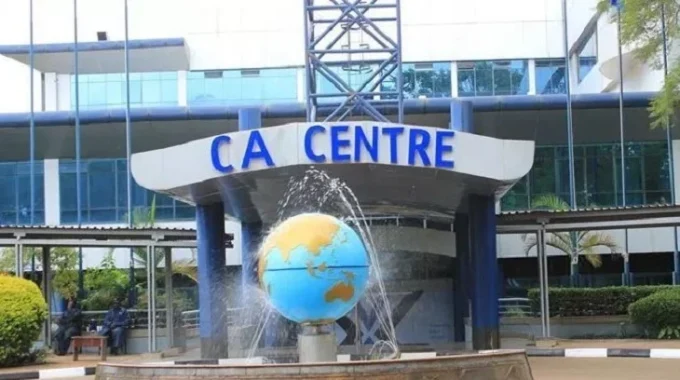[dropcap]S[/dropcap]afaricom has pulled off a historic feat by becoming Kenya’s first company to hit the Ksh1.2 trillion mark in market valuation, a decade after the share was floated at the Nairobi Securities Exchange.
The company’s market capitalisation is equivalent to the next 20 largest companies at the NSE. And, if Safaricom was a country, it would be larger than the world’s 15 smallest countries in terms of GDP, among them Vanuatu, Guinea Bissau, Dominica, Comoros and Gambia.
For a 17-year-old company, these are staggering statistics. Safaricom was floated in March 2008 at a time of great optimism about the performance of other shares driven by strong macro-economic environment over the previous five years. The share was oversubscribed by over 500%.
On the first day of trading, the share rose 47% underlining the great interest in the fast-growing company. But the share price almost immediately flew into headwinds spurred by unexpected macro-economic factors at home and abroad, and a rush to sell by some shareholders who were angling for a quick kill.

The share had been floated in the wake of Kenya’s biggest political crisis in the country’s independent history – the post-election violence that followed the hotly contested but bitterly disputed 2007 General Election.
Abroad, the global financial crisis was fast gathering storm, shaking up foreign investors who held huge portfolios in the new stock.
Three months after launch, the Safaricom share price had fallen from a high of Ksh7.58 to a low of Ksh3.70. Two months later, it dipped further to the Ksh3 mark where it celebrated its first anniversary on the stock exchange. It hit rock bottom one dark day in February 26, 2009 before it started the slow but steady climb to last week’s close of Ksh27.75.
At its peak, Safaricom’s shares hit Ksh33.50, signaling a comeback for a company that many shareholders had initially written off. A shareholder who had, say 1,000,000 shares when the share price bottomed out at Sh2.55 (worth Shs2.55 million) would today be worth Shs28 million. And this excludes the generous dividends that Safaricom has been dishing out.
Even during the worst of times, consumers stayed true to Safaricom products and services oblivious of the global financial crisis and sending other critical business data on a gravity-defying trajectory.
On the first anniversary of the share offering, business revenues jumped to Ksh70.5 billion up from Ksh61.4 billion the previous year. It was a reflection of a growing customer base which in the same period expanded from 13.4 million to 15.7 million.
But the share price was to face yet another hurdle.
Safaricom had become synonymous with Michael Joseph, the founder CEO who had been described by the Daily Nation as “one hell of a manager. Not so much because of growing Safaricom from a scrappy mobile operator 10 years ago to a market leader and money machine, but more so for his knack for doing the right thing for his firm at the wrong time for his rivals.”
READ: CEO WHO SKIPPED CLASSES NOW OWNS SOAP FACTORY
The time for Mr Joseph to exit the ship in October 2010. What would this portend for the new leadership under incoming CEO Bob Collymore?
Even Joseph knew there was a problem. “The mood is quite sad here,” Mr Joseph had said at the time. “Employees are a bit concerned but determined.”
Simultaneously Safaricom was in the middle of a bruising price war with Zain – one of the corporate forerunners to Airtel. Upon Collymore’s entry, the share price see-sawed between Ksh2.55 which has been the lowest ebb to date and Ksh6 underlining the uncertainty at the time.

Even then, consumers were voting for Safaricom with their wallet and Collymore had something to show for that confidence at his first full year results in May 2011.
The revenues had grown by 12.9% from Ksh83.96 billion to Ksh94.8 billion while the customer base had expanded by 8.8 per cent from 17.2 million to 19 million. In August 2011, the share price had inched up slightly to Ksh2.75, signaling the resurgence of the share price.
In that year, the company’s profits had dipped to Ksh13.3 billion from a record Ksh15.1 billion the previous year, which was no good news for a brand new CEO raring to make a mark.
The following year, the profits dipped even further to Ksh12.63 billion which however marked the low end of the trough, and a comeback was in the making. This marked a bounce-back to profitability which soared to Sh17.5 billion in 2013, a significant five-year milestone since the company was quoted on the stock exchange. The company declared a dividend of Ksh0.31 per share up from Ksh0.20 the previous year.
SEE: BUY OR SELL? ANALYSTS WEIGHT IN ON SAFARICOM SHARES
It was the same year that things began to seriously look up for the telco’s share price while other vital indicators retained a steady upward trajectory. Since 2013, the subscriber base had expanded from 19.4 million active users to the 29.6 million as reported at the Full Year 2018 results reported on last Wednesday.
This year’s dividend of Ksh1.10 is three times higher than it was in 2013. Investors are also voting with both feet for Kenya’s top performing company, taking the share price beyond Ksh28 with a market cap of more than Ksh1.2 trillion (approximately $12 billion).
The net profits have also risen threefold in the last five years, hitting a record high of Ksh55.29 billion this year.
Speaking from London where he is on medical leave, Collymore said: “I would like to say that I am extremely pleased to be presenting to our investors and stakeholders a good set of results, where we finished ahead of the guidance we gave last year.
Cutting-edge products
“To achieve these results, we sharpened our focus on delivering relevant products and services, organisational effectiveness and putting our customers first; a strategy that was exceptionally executed considering the challenging business climate that the last year presented to us and many other businesses in Kenya,” he said.
To drive growth, the company has been investing an average of Ksh30 billion in the network in order to bring to offer the market differentiated, cutting-edge products and enhance customer experience.
And the team at Kenya’s foremost company has now set its sight on new heights according to Sateesh Kamath, Safaricom’s Chief Finance Officer, by leveraging on data and next generation products.
“In the coming financial year, we look to drive long-term shareholder value by deploying next-generation network services, leveraging data analytics and segmentation, guided by our purpose of transforming lives to turn innovative ideas into realities,” said Sateesh Kamath.
[This article was first published in the Sunday Nation]
NEXT: THE SOCIAL SCIENTIST SLAYING IN FASHION WORLD








![President William Ruto during the launch of Climate WorX in Nairobi. [Photo/PCS]](https://businesstoday.co.ke/wp-content/uploads/2024/10/President-William-Ruto-during-the-launch-of-Climate-WorX-in-Nairobi-1-e1727761613802.png)










































![Pula Co-Founders and Co-CEOs, Rose Goslinga & Thomas Njeru. Pula provides agricultural insurance and digital products to help smallholder farmers manage climate risks, improve farming practices and increase their incomes. [ Photo / Courtesy ]](https://businesstoday.co.ke/wp-content/uploads/2021/01/Pula-Co-Founders-and-Co-CEOs-Thomas-Njeru-Rose-Goslinga.jpg)




























































Leave a comment